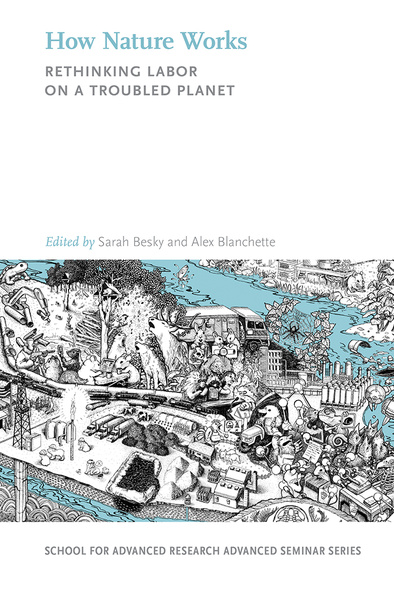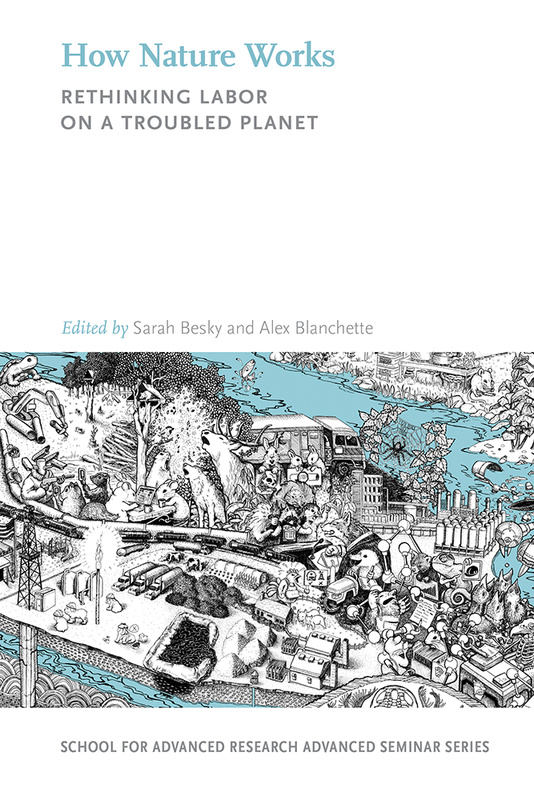How Nature Works
Rethinking Labor on a Troubled Planet
Winner of the 2021 Society for the Anthropology of Work (SAW) Book Prize
We now live on a planet that is troubled--even overworked--in ways that compel us to reckon with inherited common sense about the relationship between human labor and nonhuman nature. In Paraguay, fast-growing soy plants are displacing both prior crops and people. In Malaysia, dispossessed farmers are training captive orangutans to earn their own meals. In India, a prized dairy cow suddenly refuses to give more milk. Built from these sorts of scenes and sites, where the ultimate subjects and agents of work are ambiguous, How Nature Works develops an anthropology of labor that is sharply attuned to the irreversible effects of climate change, extinction, and deforestation. The authors of this volume push ethnographic inquiry beyond the anthropocentric documentation of human work on nature in order to develop a language for thinking about how all labor is a collective ecological act.
This volume will interest graduate students and professors in anthropology, geography, and sociology whose work deals with post-humanism, labor, industrialization, and research on plantations and monocultures.'--J. Asselin, Choice
Sarah Besky is an assistant professor of anthropology and international and public affairs at Brown University. She is the author of The Darjeeling Distinction: Labor and Justice on Fair-Trade Tea Plantations in India. Alex Blanchette is an assistant professor of anthropology at Tufts University.
Contents
Foreword
Thomas G. Andrews
Acknowledgments
Introduction: The Fragility of Work
Sarah Besky and Alex Blanchette
Part One. The Ends of Work
Chapter One. Exhaustion and Endurance in Sick Landscapes: Cheap Tea and the Work of Monoculture in the Dooars, India
Sarah Besky
Chapter Two. The Concentration of Killing: Soy, Labor, and the Long Green Revolution
Kregg Hetherington
Chapter Three. Making Monotony: Bedsores and Other Signs of an Overworked Hog
Alex Blanchette
Part Two. Labor Struggles
Chapter Four. The Job of Finding Food Is a Joke: Orangutan Rehabilitation, Work, Subsistence, and Social Relations
Juno Salazar Parreñas
Chapter Five. The Heat of Work: Dissipation, Solidarity, and Kidney Disease in Nicaragua
Alex Nading
Chapter Six. Metabolic Relations: Korean Red Ginseng and the Ecologies of Modern Life
Eleana Kim
Chapter Seven. How Guinea Pigs Work: Figurations and Gastro-Politics in Peru
María Elena García
Chapter Eight. Industrial Materials: Labor, Landscapes, and the Industrial Honeybee
Jake Kosek
Part Three. Futures of Work
Chapter Nine. Cultural Analysis of Microbial Worlds
John Hartigan Jr.
Chapter Ten. Rhapsody in the Forest: Wild Mushrooms and the Multispecies Multitude
Shiho Satsuka
Chapter Eleven. Kamadhenu's Last Stand: On Animal Refusal to Work
Naisargi N. Dave
References
Contributors
Index





